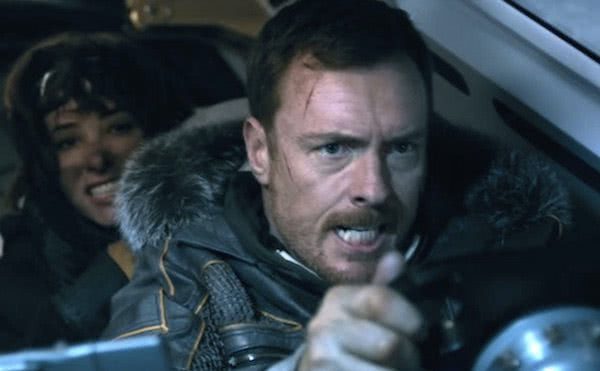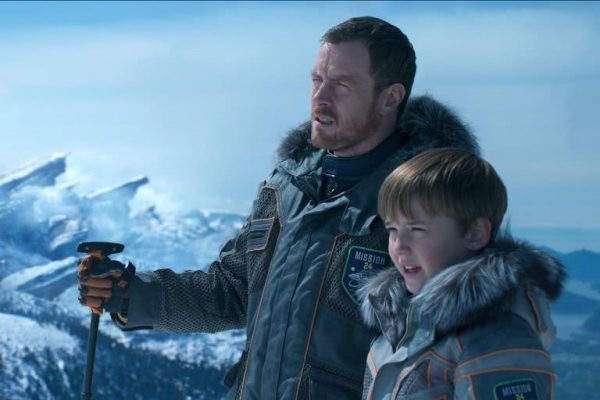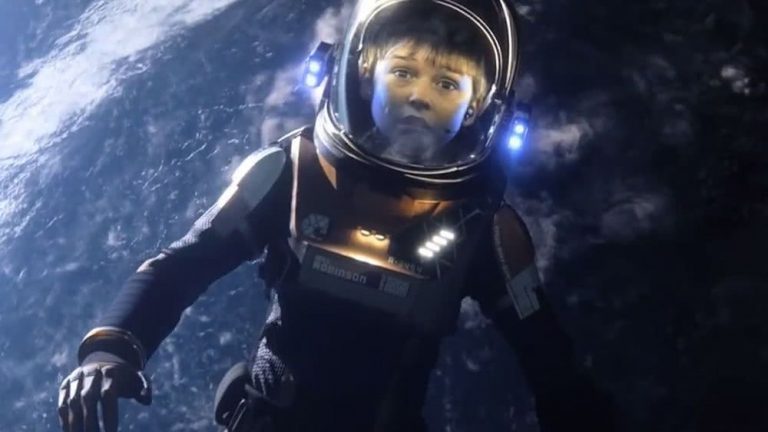The new reboot of Lost In Space will conjure different feelings depending on when you first encountered the story of the Robinson family who get stranded in the cosmos.
Fans of the 1960s television series might remember seeing the show for the first time, or catching a re-run. You might cringe at the thought of the awful blockbuster film from the 1990s that tried to sell Matt LeBlanc as an action hero. Even the iconic theme song may have been stuck in your head at some point.
Netflix have retooled Lost In Space, and what’s most striking about the 2018 version is how it evokes nothing from the past. The show forges ahead with a slick new space adventure, great modern family dynamics and light touches of science fiction.

“The Robinsons are playing a card game when their mission goes bad, and the image of the Robinsons in space suits floating cards to each other in zero gravity is symbolic of the show itself.”
In the year 2046, the Robinson family get marooned on a mysterious planet after a mission to colonise a new world hits a catastrophic snag in transit. Mum and dad, Maureen (Molly Parker) and John (Toby Stephens), must keep their children, Judy (Taylor Russell), Penny (Mina Sundwall) and Will (Maxwell Jenkins), safe from danger while trying to connect with other colonisers.
Of the survivors they initially encounter are a psychologist, Dr. Smith (Parker Posey), and a pilot, Don West (Ignacio Ariel Serricchio).
The Robinsons are playing a card game when their mission goes bad, and the image of the Robinsons in space suits floating cards to each other in zero gravity is symbolic of the show itself.
Love Film & TV?
Get your daily dose of everything happening in music, film and TV in Australia and abroad.
Lost In Space has a lot of science-fiction gloss
The sets, costumes, vehicle design and digital effects are similar in style to a Ridley Scott production like The Martian, or the rebooted Battlestar Galactica.
“The show forges ahead with a slick new space adventure, great modern family dynamics and light touches of science fiction.”
It’s pure blockbuster television. The first episode is directed by Neil Marshall whose television credits include Game Of Thrones, Hannibal and Westworld (he also made the ace horror films Dog Soldiers and The Descent), and it has shades of the unforgettable first episode of Lost. Every item the Robinsons use is practical without requiring too much futuristic mumbo jumbo to explain, which makes the show feel close to our own times – Elon Musk’s SpaceX pops to mind a lot – while remaining just out of reach to allow for a little suspension of disbelief. Yet at its core, Lost In Space is a family drama.
Show creators, Matt Sazama and Burk Sharpless, set out to show a family united on the surface – but The Robinsons are far from perfect. It doesn’t matter how many lightyears The Robinsons put between themselves and Earth, their problems follow, and Lost in Space spends most of its 10 episode run jumping between the present and the past to flesh out their grievances. Simply put, the mission to colonise a new planet is Maureen and John’s last shot at making their marriage work.

The modern breakdown of a family depicted in Lost In Space 2018 is in stark contrast with the beaming smiles of the colourful family from the ’60s. Trying to keep The Robinsons together is juxtaposed with the mission’s goal of creating a utopia, which is depicted brilliantly in ‘how to create a colony’ videos that play in the each spacecraft and resemble commercials depicting wealthy housing estates with display homes. Perfect families and worlds don’t exist; will humans never learn that?
The volatile nature of the planet and its wildlife challenges the Robinsons and their fellow colonisers, which triggers a divide between family and self-preservation. Each episode presents a different life or death scenario while the mystery of who (or what) sabotaged the mission slowly reveals itself. Lost In Space has enough secrets to keep it compelling in its first season, but there’s a ticking clock on how long the writers can drag it out before it becomes manipulative. The depiction of life on Earth in 2046, mostly glimpsed in flashbacks or mentioned in conversations, is spookily similar to the same dilemmas plaguing us; governments are unstable, pollution has blocked out the sky and bookstores are extinct. There’s a scene where Maureen tells her children they have no future on Earth – nobody does.
An eerie performance by Posey as Dr, Smith, one of the shows biggest mysteries, transforms the character into a complex antagonist. Smith manipulates The Robinsons for selfish reasons but her backstory is handled well enough that you empathise with why she despises the idea of a stable family. All the female characters are presented as smart and capable but they are vulnerable and allowed to fail, especially Maureen, played stoically by Parker who gives a performance as though she’s the captain of The Enterprise on Star Trek.
Lost In Space works best when the splintered family and supporting characters are united in survival
The show has an adventurous spirit and the presence of the younger characters give it a young adult edge reminiscent of The 100 (minus all the tribal murder and genocide). Even Will Robinson’s relationship with an alien ‘robot’ who utters the famous line, “danger, Will Robinson”, is similar to the John Connor and Terminator bond in Terminator 2: Judgement Day.
The first season of Lost in Space is a masterclass in reinvention. The nostalgic beats are rare and it avoids winking at the audience, while the personal problems of the Robinson family match the peril of being marooned. After a rough start to the year for Netflix with series that aren’t reality shows, they finally have a hit on their hands with Lost in Space.

































